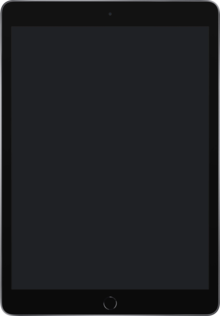iPad (9th generation)
 iPad (9th generation) in Space Gray | |
| Also known as | iPad (9th generation), iPad 10.2-inch, iPad 9, iPad (2021) |
|---|---|
| Developer | Apple |
| Product family | iPad |
| Type | Tablet computer |
| Generation | 9th |
| Release date | September 24, 2021 |
| Introductory price | USD$329 |
| Discontinued | May 7, 2024 |
| Operating system | Original: iPadOS 15 Current: iPadOS 18.1, released October 28, 2024[1] |
| System on a chip | Apple A13 Bionic with 64-bit architecture and embedded motion co-processor |
| CPU | Hexa-core (2× Lightning and 4× Thunder) |
| Memory | 3 GB LPDDR4X SDRAM |
| Storage | 64 or 256 GB[a] |
| Display | 10.2 inches (260 mm) 2160 × 1620 px (264 ppi) with a 4:3 aspect ratio, 500 nits max brightness (typical)[2] |
| Graphics | Apple-designed quad-core |
| Sound | Stereo speakers |
| Input | Multi-touch screen, headset controls, proximity and ambient light sensors, 3-axis accelerometer, 3-axis gyroscope, digital compass, dual microphone, Touch ID fingerprint reader, barometer |
| Camera | Front: 12 MP, 1080p HD, ƒ/2.4 aperture Rear: 8.0 MP AF, iSight with Five Element Lens, Hybrid IR filter, video stabilization, face detection, HDR, ƒ/2.4 aperture |
| Connectivity | All models:
Wi-Fi + cellular models:
|
| Power | 32.4 W·h, up to 10 hours of battery life |
| Online services | App Store, iTunes Store, iBookstore, iCloud, Game Center |
| Dimensions | 250.6 mm (9.87 in) H 174.1 mm (6.85 in) W 7.5 mm (0.30 in) D |
| Mass | Wi-Fi: 487 g (1.074 lb) Wi-Fi + Cellular: 498 g (1.098 lb) |
| Predecessor | iPad (8th generation) |
| Successor | iPad (10th generation) |
| Website | iPad 10.2-inch (9th generation) at the Wayback Machine (archived May 3, 2024) |
The iPad (9th generation)[3][4] (also referred to as the iPad 10.2-inch) is a tablet computer developed and marketed by Apple as the successor to the eighth-generation iPad. It was announced on September 14, 2021, and released on September 24. The ninth-generation iPad was discontinued on May 7, 2024, with the announcement of the iPad Air (6th generation) and the iPad Pro (7th generation). It was the last base iPad model to have a home button, Lightning port and headphone jack.[5]
Features
[edit]| This article is part of a series on the |
| iPad |
|---|
| List of iPad models |
The ninth-generation iPad has the same design as the seventh- and eighth-generation iPads, although all color options now come with a black screen bezel, and the gold colour option has been removed.[clarification needed] It is compatible with the first-generation Apple Pencil, and the Smart Keyboard and Smart Connector for keyboard attachments.[6] It uses the A13 Bionic chip which was previously seen in the iPhone 11 in 2019, which Apple claims gives a 20% CPU, GPU, and Neural Engine increase in performance compared to its predecessor. It features a 10.2-inch Retina display identical to the previous models, with 1620 by 2160 pixels at a density of 264 PPI, and includes True Tone technology, meaning the display can adjust its color temperature based on the surrounding lighting temperature. A new 12 MP front camera (122 degree wide-angle)[7] is fitted in place of the 1.2 MP camera of previous models, which features Center Stage technology that detects the user and moves the camera view accordingly during video recording and calls. The rear 8 MP camera is from the earlier iPad Air 2. The base storage is doubled to 64 GB.[6] iPadOS 15 is pre-installed at release.[6]
Reception
[edit]The New York Times called the 9th-generation iPad "the best tablet for almost anyone" in 2022, praising its price, performance and features.[8] CNET gave it a 8.1/10, and praised the iPad for its performance and increased storage over its predecessor, however, criticizing it for its outdated design.[9]
Timeline
[edit]| Timeline of iPad models |
|---|
 |
Source: Apple Newsroom Archive.[10]
Notes
[edit]- ^ 1 GB = 1 billion bytes
References
[edit]- ^ "About iPadOS 18 Updates". Apple Support. iPadOS 18.1.
- ^ "Compare iPad models". apple.com. Archived from the original on October 24, 2012. Retrieved April 21, 2021.
- ^ "iPad 10.2-inch". Apple. Archived from the original on July 31, 2020. Retrieved September 28, 2021.
- ^ "iPad (9th generation) – Technical Specifications". support.apple.com. Archived from the original on September 28, 2021. Retrieved September 28, 2021.
- ^ "iPad 9th Gen Review". Wolf of Tablet. Retrieved July 24, 2024.
- ^ a b c "iPad 10.2-inch – Technical Specifications". Apple. Archived from the original on September 14, 2021. Retrieved September 15, 2021.
- ^ "iOS 17 Review: StandBy Mode Changed My Relationship With My iPhone". CNET. Retrieved September 18, 2023.
- ^ "The iPad Is the Best Tablet". The New York Times. ISSN 0362-4331. Archived from the original on January 26, 2022. Retrieved September 22, 2022.
- ^ "Apple iPad 9th Gen Review: Low-Cost Option May Be Best Bet for Now". CNET. Retrieved December 11, 2023.
- ^ Apple Inc. (2010–2011). iPad News – Newsroom Archive. Retrieved June 7, 2018.
